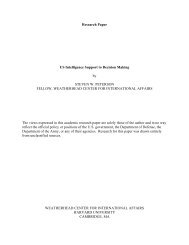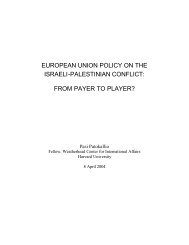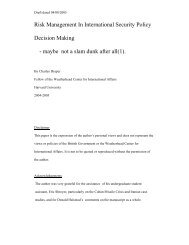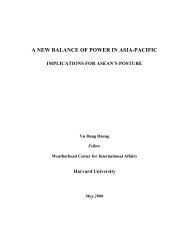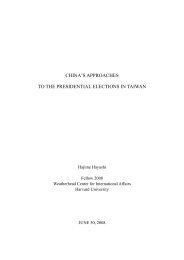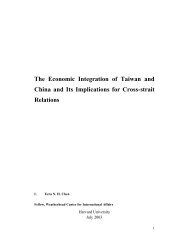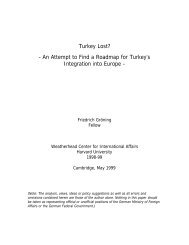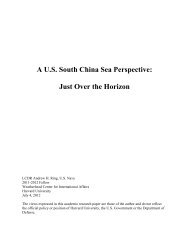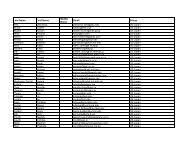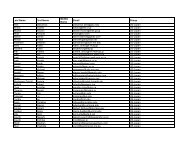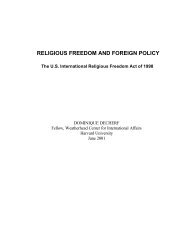A U.S. South China Sea Perspective: Just Over the Horizon
A U.S. South China Sea Perspective: Just Over the Horizon
A U.S. South China Sea Perspective: Just Over the Horizon
You also want an ePaper? Increase the reach of your titles
YUMPU automatically turns print PDFs into web optimized ePapers that Google loves.
Almost every speech by senior U.S. officials concerning <strong>the</strong> <strong>South</strong> <strong>China</strong> <strong>Sea</strong> have included <strong>the</strong><br />
disclaimer: “<strong>the</strong> United States does not take sides in territorial disputes and encourages disputing<br />
parties to resolve such issues without coercion.” 62 However, this effort to appear impartial is<br />
difficult to maintain against <strong>the</strong> backdrop of <strong>the</strong> United States’ massive engagement to draw<br />
every country that borders <strong>the</strong> <strong>South</strong> <strong>China</strong> <strong>Sea</strong> — except <strong>China</strong> — into its political-military<br />
sphere.<br />
The Pentagon’s most recent East Asia strategy report issued by Secretary of Defense<br />
William Cohen in November 1998 stated<br />
that U.S.-PRC dialogue is critical to ensure understanding of each o<strong>the</strong>r’s regional<br />
security interests, reduce misperceptions, increase understanding of PRC security<br />
concerns, and build confidence to avoid military accidents and miscalculations. 63<br />
Unfortunately, <strong>the</strong> last fourteen years have been marred by military incidents and economic<br />
tensions that have prevented meaningful engagement and cooperation. Most recently, <strong>China</strong><br />
broke off its U.S. military relations in January 2010 after <strong>the</strong> United States announced a US$6<br />
billion arms package for Taiwan. This break in military-to-military relations would last until<br />
2011.<br />
Secretary of State Hillary Clinton stressed <strong>the</strong> need for cooperation in <strong>the</strong> region in a<br />
November 2011 speech at <strong>the</strong> East-West Center in Honolulu:<br />
[A]nd just as <strong>the</strong> United States played a central role in shaping that architecture across <strong>the</strong><br />
Atlantic — to ensure that it worked, for us and for everyone else — we are now doing <strong>the</strong><br />
same across <strong>the</strong> Pacific. The twenty-first century will be America’s Pacific century, a<br />
period of unprecedented outreach and partnership in this dynamic, complex, and<br />
consequential region. 64<br />
With <strong>the</strong> largest global reach and resources, <strong>the</strong> U.S. Navy can represent <strong>the</strong> face of this outreach<br />
and partnership in <strong>the</strong> Pacific. However, in <strong>the</strong> case of <strong>China</strong>, <strong>the</strong> U.S. Navy has fallen short in<br />
38



